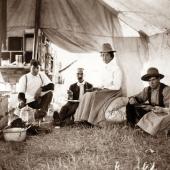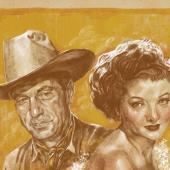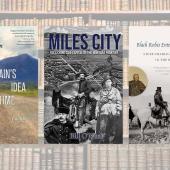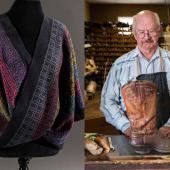WILD WEST WORDS (Winter 2020)
Sparrow
Sparrow is the generic name for a variety of small, common birds found the world over. These hardy little creatures have adapted to almost every type of environment, flourishing in prairie, marsh and desert. Even one of the New Testament gospels alludes to the ubiquity of the sparrow; in the book of Matthew, Jesus asks, “Are not two sparrows sold for a penny?”
About 50 species of sparrow are native to North and South America, with such charming names as fox, vesper, black-chinned, and golden-crowned. The house sparrow, a common year-round resident in Montana, was introduced to North America from Europe in the mid-1800s. Imported to the New World to eradicate a larvae that was defoliating elms on Manhattan Island, the several pairs of European house sparrows released there are the ancestors of the millions now spread across the continent.
Sparrow is a word of considerable antiquity, first appearing in print in the 12th century. It derives from the Old English word spearwa, meaning “flutterer,” and was applied by speakers of the language to any small, fluttering bird. The French call the creature moineau, or “monk,” evoking the sparrow’s dull plumage that resembles a monk’s robe.
MaryJane, et. al.
Declare something illegal or immoral, and a motley pack of slang words will materialize to follow it everywhere. Marijuana, for example, acquired a host of slang names after it became illegal in the U.S. in 1937. Passed from early 20th century jazz musicians to jivesters to hipsters to hippies, marijuana slang is colorful, lively and fugitive in origin. Speculation surrounds the etymology of many terms associated with cannabis and its consumption. Here is a marijuana glossary in brief:
Reefer (marijuana cigarette), first cited 1937, possibly from Central American Spanish grifa, “drunk, intoxicated.”
Ganja (a preparation of Indian cannabis), 1800, from the Hindi word for the plant.
Pot (cannabis), 1936. The most popular (but unconfirmed) theory has the word a derivative of potación de guaya, “drink of grief,” supposedly denoting a concoction of wine or brandy in which marijuana buds were steeped.
Toke (to inhale a marijuana cigarette), 1952, possibly from Spanish tocar, “to touch” or “get a part of.”
Doobie (marijuana cigarette), 1967. Origin unknown.
Roach (the butt of a reefer), 1935, perhaps a reference to its brown and stubby resemblance to a cockroach.
Bong (a water pipe for smoking marijuana), 1971, from the Thai word for a tubular section of bamboo.
Joint (marijuana cigarette), 1935, perhaps from the notion of something smoked in common or “jointly.”
Bogart the joint (reluctant to share the reefer with others), 1969, from the image of chain-smoking Humphrey Bogart forever dangling a cigarette between his lips.
Marijuana (a preparation of cannabis), 1874, origin uncertain. Some trace it to a Chinese word for the plant, ma ren hua; others point to the colloquial Spanish way of saying “Chinese oregano” — mejorana chino. The Bantu word for cannabis is ma-kaña; perhaps African Angolans enslaved by the Portuguese brought the term to Brazil. Or it could be simply a conjoining of two Spanish names, Maria and Juana.
Cannabis, 1687. The Latin word for the hemp plant.
Blacksmith
By the 15th century, most European citizens had surnames that had been assigned to their families for census and taxation purposes. Many families were “Smiths” because metalworking was one of the most common—and important—occupations in medieval Europe. The surname Smith derives from the Old English verb smitan, “to strike, hammer.”
Relied upon to forge essential objects of daily life, metal smiths were among the most highly skilled specialists in Europe and carried their surnames proudly. The Whitesmiths worked with tin (the “white” metal), the Greensmiths with lead; the Brownsmiths and Redsmiths were copper specialists. In many cases, these original occupational surnames were shortened to White, Green and Brown.
Blacksmiths may have been the most essential of the metal workers. Specializing in iron, the so-called “black” metal, these specialists forged an astonishing array of important objects: nails, ploughshares, axes, bolts, sickles, chains, fireplace implements, wheel rims and other parts for wagons.
Blacksmiths specializing in horseshoeing became farriers, from the Latin ferrum, “iron.” Farriers were important in a young America that relied heavily on horsepower for traction and transportation. As 20th century automobiles and tool-making factories minimized the need for horseshoes and other hand-forged iron implements, blacksmithery became a declining trade.
The derived surname Smith, however, remains the most prevalent in the English-speaking world, a testament to the ubiquity of the profession. In Montana and 38 other states, the surname Smith outnumbers all others.












Leave a Comment Here